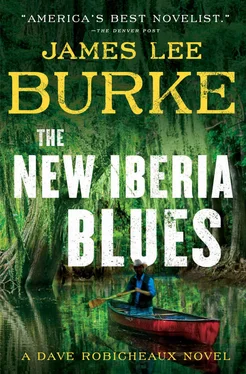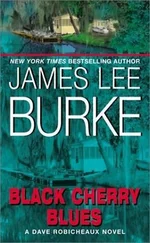“Desmond Cormier knows the truth, but he’s never going to tell us.”
“His half sister was murdered. What the hell is wrong with this guy?”
“Money and power,” I said. “You know a stronger drug?”
“How about getting up in the morning with a clear conscience?” he replied. “You talked with Butterworth before he went out. You believed he capped himself?”
“I think maybe someone was setting up Cormier, and I think he’s too dumb to know it.”
I fixed a bowl of Grape-Nuts and milk and blackberries and ate it on the back steps. I also brought a bowl of cat food for Snuggs and Mon Tee Coon. The trees were dripping with humidity, the bayou high and swollen with mud, the flooded elephant ears along the bank beaded with drops of water that slid like quicksilver off the surface. I heard a vehicle pull into the driveway, then footsteps coming around the side of the house.
“Hope I ain’t disturbing your Sunday morning,” Sean said. He was in uniform, his cheeks bright with aftershave, his gun belt polished, the creases in his trousers as sharp as knife blades.
“Get yourself a cup of coffee off the stove. Alafair is still asleep. Give me a refill, too.” I handed him my cup.
He went inside and came back out with a filled cup in each hand. He sat down beside me and looked at Snuggs and Mon Tee Coon. He had a small mouth, like a girl’s, and eyes like a child’s. “I went out to the airport this morning.”
“What for?”
“To watch them movie people take off. They were happy, like all the things that happened here don’t mean anything.”
“I’m not following you.”
“I killed a man. I’ll have him in my dreams the rest of my life. None of this would have happened if it hadn’t been for these people.”
“Blame other people, and you’ll never have peace.”
“That’s what you told yourself in Vietnam?”
“I wasn’t that smart.”
“Dave, I’d give anything if I hadn’t shot Tillinger. It’s eating me up.”
“I don’t think Tillinger would hold it against you, Sean. He made a choice — the wrong one. Wherever he is, I think he knows that and forgives you for it.”
“You don’t dream about the men you killed?”
“Sometimes.”
“What do you do about it?”
“Not drink.”
He put down his coffee cup and rubbed one hand on top of the other. “I feel like I ain’t no better than them deputies that suffocated the deaf man at the jail.”
“You’re nothing like those deputies.”
“That’s a sad story, you know? I heard the deaf man was trying to make sign language when he died.”
I looked at my watch. “I’m going to Mass at St. Edward’s. Want to go?”
“Thanks for the coffee. I appreciate you listening to me.”
“Run that by me again about the deaf man and sign language?”
After he was gone, I went to St. Edward’s. When I returned, a note was on the refrigerator door. It said: Went to Café Sydnie Mae for brunch. See you this afternoon.
I looked out the side window. Alafair’s car was still in the porte cochere. I called her cell phone. The call went straight to voicemail. I called the Café Sydnie Mae in Breaux Bridge. She wasn’t there. It was 11:14 a.m.
I went to the office and opened my file drawer and took out every folder I had on the series of homicides that had begun with the murder of Lucinda Arceneaux. I also accessed every bit of electronic information I could find on Frank Dubois, the deaf man who had been suffocated in the Iberia Parish jail. He had one of those rap sheets that was full of contradictions, like a puzzle box shaken up and dropped on the floor. He grew up in New Orleans, on the edge of the Garden District, and attended Tulane University for three years in the 1960s, but was arrested twice for possession; then he cruised on out to sunny CA and got hooked up with the Mongols. He had half a dozen narcotics-related arrests in San Bernardino, Bakersfield, and Oakland, and ended up spending a year in Atascadero. A prison psychologist had noted in the margin of his sheet: I.Q. above 160, symptoms of borderline personality disorder. Antisocial, narcissistic, and fears isolation and physical restraint. Potentially dangerous.
I went through my notes on all the victims. Joe Molinari still perplexed me more than the others. Why did our killer want to murder such a harmless man? His jobs took him nowhere, and his employers were of no substance and rarely kept records. Except one: Molinari had been a janitor for two years at the Iberia Parish courthouse.
This may sound strange to an outsider, but the patronage culture in Louisiana is systemic, from the most humble kind of work to the governor’s office. Procedure, honorable conduct, attention to the rules, acuity, experience, and skill have secondary value at best. You cannot get a state job cleaning a toilet unless you know someone. For a man like Molinari — who did asbestos teardowns — a steady paycheck, decent hours, health insurance, social security, and unemployment coverage were a gift from God.
So who got him the job? I called Helen and asked.
“I remember him working at the courthouse,” she said. “He kept to himself.”
“No friends?”
“He used to eat lunch with a deputy by the cemetery.”
“Which deputy?”
There was a long silence.
“Helen?”
“One of the guys who suffocated the inmate at the jail. Son of a bitch.”
I could hear the receiver humming in my ear. “You can’t be expected to remember information from twenty-five years ago.”
“No, no, I screwed up. The deputy was his cousin. He probably put in a word for Molinari and got him the job. Maybe Molinari’s death is connected to the scandal at the jail.”
“Could be,” I said.
“Dave, I had my head up my ass. I pulled your badge when I should have pulled my own. The deaf man, what was his name?”
“Frank Dubois,” I said.
“Where was he from?”
“New Orleans. He went to Tulane. A former AB kid named Spider Dupree said that Dubois had a coat of arms tattooed on his back and spoke Latin or Greek.”
“Dave, I need to apologize to you. I acted like a real bitch.”
“You may be lots of things, but that’s not one of them,” I said.
“That’s why I love you, Pops.”
I called Bailey and told her what I’d learned.
“You think Molinari was payback for the suffocation death?” she said.
“Yeah, I do.”
“So who’s the tie-in with Molinari?”
“I don’t know. Maybe one of our movie friends.”
“I need to tell you something,” she said. “Desmond called me last night.”
“You don’t have to tell me anything, Bailey.”
“He asked me to go to Arizona with him. I told him no.”
“Bailey—”
“I don’t know if it’s over between us or not,” she said.
“It was wrong from the jump. Not on your part. Mine. I took advantage of the situation.”
“I’m a victim?” she said. “I’m too young and inexperienced to know what I’m doing?”
“Got to go, Bailey.”
“Every time we talk, I feel like someone extracted my heart.”
I eased the phone down in the cradle and stood at the window, looking down at the Teche and the sunlight flashing as brightly as daggers on the current.
I called Desmond Cormier’s home number. There was no answer. I called Sean McClain on his cell phone. “This morning at the airport, who’d you see get on the plane?”
“There was two planes,” Sean said.
“Okay, who’d you see get on?”
“I don’t know their names.”
“You saw Desmond Cormier?”
“No, sir.”
“How about Lou Wexler?”
“I don’t know who that is. What’s wrong?”
Читать дальше












